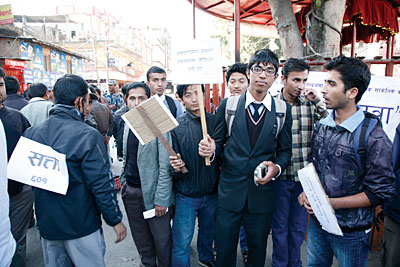 |
In an episode of the White House presidential drama West Wing a young Republican attorney, Ainsley Hayes, denounces efforts to pass an Equal Rights Amendment (ERA) to the US Constitution. "Women do not need any special constitutional protection," she says. "They are already protected by the 14th Amendment," an 1868 addition to the constitution that provides equal rights and protection to all citizens.
"Well, then I guess you just love that wage gap," replies her colleague. "We believe in the ERA. How can you have an objection?" "Because it's humiliating," Hayes replies. "I do not have to have my rights handed down to me by a bunch of old white men. The same Fourteenth Amendment that protects you protects me. And I went to law school just to make sure."
A surprising demographic in Nepal that is seeking the hand-holding that Hayes would call humiliating is the group of 'youth' whose advocates fought hard to pass a National Youth Policy in 2008. It was the first such policy paper to be promulgated in history recognising youth as a special group needing privileges, while in reality they make up a major chunk of the demographic. It also stretched the definition of youth as people from 16-40 years old, a broad spectrum if you consider that the United Nations defines youth as 16-24 years in age.
Granted, the definition of youth varies among countries worldwide because besides biology, social and cultural factors determine how someone is treated. In Nepal, youth has come to mean powerlessness. It was because of this that Sushil Koirala and Ram Chandra Poudel remained 'youth leaders' until the party gave them some authority. But have the youths themselves, the real ones, fared any better in changing this dynamic?
When formulating the National Youth Policy, the age group of 16- 40 was chosen at the insistence of the student organisations of the political parties, who remain in college way into their 30s and 40s, politicking instead of studying. The young political leaders also form a branch of Nepal's 'patronage network'. International Crisis Group observed in its September report that the state's "raison d'�tre is not serving citizens so much as servicing the needs of patronage networks and keeping budgets flowing and corruption going."
Meanwhile, young people on the street (I am still sticking with the official age group here), see this dynamic and feel powerless. Only a few days back a few hundred 'young' people gathered in front of the BICC and walked backwards to Singha Darbar to protest the lack of progress in constitution writing and the selfish attitude of the political leaders who are impeding progress.
When one of the participants was asked why he was at the march he said the CA members were not listening to people like him. The solution, he said, was to get young people into the decision-making process. But there are 137 members in the Constituent Assembly below the age of 35. If you whack another hundred 20-year-olds in there, nothing substantial is going to change.
In fact, tokenisms like the National Youth Policy have further disadvantaged this broad demographic. Young people make up the largest chunk of the electorate. In a democracy, votes are power.Young people think they are a special group that needs special protections and privileges. But if you can vote, if you can legally marry, and if you can have children, you are an adult. Ask to be treated like one. We should abolish the word 'youth' from our political lexicon, and lobby instead for an education, health or business policy. Perhaps a few Ainsley Hayes would do the trick.
READ ALSO:
Re-generation, RUBEENA MAHATO
Plastic out, students in



